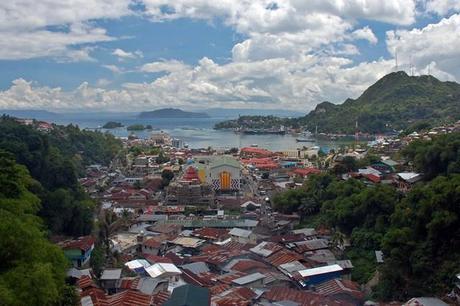 Looking down- way, way down- at Totem. Jayapura, Papua, Indonesia
Looking down- way, way down- at Totem. Jayapura, Papua, Indonesia
We arrive in Jayapura at midday (is 12 pm on 12/12/12 auspicious?) and go through the motions of checking in with immigration, customs, and quarantine. This eventually takes two days, but considering the amount of bureaucracy involved this ends up feeling fairly efficient (typical of the experience at any of the official offices: “take this paper, go down the street, make 5 copies and come back”). Naturally, these offices are also in different parts of town. At least the “taksi” service (actually a shared minivan used for public transportation) is cheap- about US$0.20 for a ride across town.
I make the fatal error of leaving our ship’s stamp on board. Until now, this has been a novelty- something we use to stamp the inside of our books or imprint for fun on notepaper. Now, the immigration official gives me a look that can only be described as aghast when I tell her I don’t have a ships stamp to put on that piece of paper she’s holding. She allows the process to continue with just my signature, but clearly isn’t happy about it. OK, note to self, bring stamp next time!
What we don’t realize initially is we’ve missed two critical stops: the harbormaster, who it turns out is rather offended that we did not visit him first, and the military police, who issue permits specific to travel in Papua (the surat jalan).
The harbormaster is readily resolved once we realize our error. It turns out we’ve been using his dock as a dropoff for the dinghy shuttle for some time– although we were clearly from new yachts in the harbor, it was days before any the guys who waved us ashore thought to mention that possibly we should step inside instead of walk around the side to the main road. Oops!
Getting the surat jalan was another experience altogether. The Indonesian half of New Guinea is currently divided into two provinces, Papua and West Papua. Independence movements have rumbled here for years. The indigenous Melanesian people from New Guinea are culturally vastly different from the Asiatic Indonesians. In many places, indigenous people have been forced off their land to make way for extraction- and, big surprise, they receive little to no benefit. In some cases are literally kept outside the high fences from their traditional lands. This independence movement has had increased activity in recent years, making the surat jalan a tool for the Indonesian government to watch and monitor foreigners in the area.
A visit to the anchorage by police kicks off the process. We are told to report into the intelligence police, and show up as quickly as we can- I was ashore and had to scramble back. What followed was entirely unexpected. It soon becomes apparent that we are being interrogated. Respectfully, yes, but definitely interrogated.
We are shuffled through a couple of different rooms, with a couple of different people questioning us. There is the Lt Col with a very large quantity of gold stitching and various metal insignias of rank hanging off his uniform. Later was the intelligence colonel, in a tailored version of the Indonesian suit (leisure suits never went out of style here) but specifically unmarked uniform- no name, no gold, no medals, nothing. Another round of interrogation ensues. I’m sure he was very good at getting information from us, although we couldn’t tell him much about things that we didn’t know about!
A few stories dribble out. We are told that visitors, westerners in particular, have been smuggling things in to support the Papuan freedom movement. This was not idle threat: in the last few months, there have been arrests, deaths, and extraditions for people involved with smuggling arms or knowledge or other undesirables to the rebels. It took up all of an afternoon, but eventually we were given our paper and sent off with a “we’re watching you” smile. OK. Whew. Can we go now?

